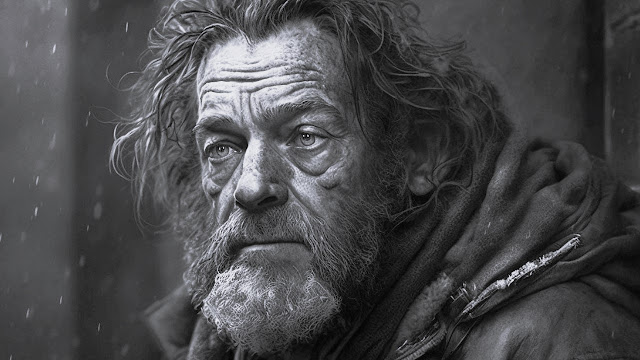Through the Eyes of the Homeless and Hopeless
The haunting sight of hopelessness fills the eyes of the homeless on a daily basis. To those who dismiss it as a mere state of mind, I pose a question: "Have you ever experienced sudden homelessness, left utterly alone with no one to lean on?" Allow me to answer on their behalf.
These individuals find themselves as hopeless as a skydiver descending with a tangled parachute. They confront the brutal truth every single day, reinforcing their dire reality. This grim awareness often drives them towards substance abuse, a temporary escape from the harshness of their existence. However, even the numbing effects of drugs fail to medicate reality. They are constantly reminded that they are the demons of truth everbody's trying to avoid.
🔥Article Choice: The Happy Complex: The Feeling of Forced Happiness
Witnessing the vacant expressions and aimless gestures in their eyes day in and day out, I grapple with the disheartening fact that some individuals are genuinely without hope. Despite my reluctance to accept this notion, the harsh reality persists. Each passing minute, year after year, reinforces this unsettling truth. It is not a figment of imagination; they are painfully aware that their usefulness to society wanes over time as they gradually deteriorating into a silent and lonely death.
These forgotten souls have already experienced the bitter taste of oblivion. They endure it every time someone deliberately averts their gaze, treating them as the walking dead. Homelessness and hopelessness gnaw at their dignity, eroding it bit by bit. Over time, they grow apathetic towards people and life itself. Why should they care?
Some among them opt to spread unhappiness throughout society, seeking a perverse equilibrium. They recognize that nobody gives a damn about their existence, thus resorting to forceful acts of violence to compel others to halt and peer into their eyes.
Recently, I passed by the place I called home for 12 years. Peering through the windows from the sidewalk, I caught a glimpse of the new owners reveling in the "hope" and security that accompany the comforts of a home. A profound sadness washed over me in that moment.
Home is a fundamental necessity for every human being, as basic as it gets. I consider myself fortunate to have grown accustomed to a wretched home during my childhood, making my experience of homelessness slightly less foreign.
Solitude and loneliness exist as two distinct realms. The former is a deliberate choice, while the latter is imposed by circumstance. I cherish my solitude, yet this year I faced the anguish of loneliness—an empty void that arises only when you lose something or someone. Its impact intensifies exponentially when you lose everything at once.
Through the forces of chaos, my solitude met loneliness, and now they live in the same space. Hopelessness is hard to accept. It wants to be part of the group, but it's hard to befriend. Hopelessness has the same look in it's eyes as the homeless or, worse, the skydiver. A stark contrast to the warm sparkle emanating from love and hope.
During a recent conversation with a longtime restaurant owner, I revealed my homeless status. Astonishingly, her response was, "You should be happy because you have a van." I simply asked her, "Have you ever been homeless?" The astonishment on her face was palpable.
This phenomenon is known as survivor's guilt. People employ various means to dismiss any reality that threatens their psychic comfort zone. They are often the first to offer matter-of-fact suggestions, assuming the recipient lacks a functioning brain. Perhaps they assume this because the recipient is homeless. They cannot fathom the idea that someone as intelligent as themselves could become homeless due to an abrupt stroke of misfortune—fate surely finds amusement in such ironies.
If you think life can suck, trust me, it can get much worse. Ask the individuals I encounter daily, their eyes devoid of hope, who lack transportation and receive minimal support beyond what food banks and homeless shelters can provide.
Driving past these individuals is one thing, but living within the same space as them is an entirely different experience. It serves as a constant reminder that you, too, could lose the flickering hope that remains. You might find yourself hurtling into an irreversible abyss situated on a street corner with a beard and a sign.
The aforementioned skydiver epitomizes hopelessness. If you believe a homeless individual experiences anything less as they deteriorate daily, bereft of hope, it's time to reconsider.
Some people face homelessness despite having family and friends, while others lack family but find solace in their friendships. However, the worst situation befalls those who possess neither family nor friends. Their fate is far more precarious, with survival as the sole barrier between them and freezing on a park bench. They must hope that their health, resources, and mindset align favorably.
Can we solve this problem? I am inclined to believe we cannot, but we have the capacity to exacerbate it. Each person we ignore or fail to nurture contributes to the perpetuation of hopelessness. Perhaps you have already succumbed to hopelessness, unknowingly becoming a catalyst for its propagation.
Hopelessness serves as a somber teacher, imparting a potent message. It reminds us to be thankful each day for what we have, because you never know when it will show up at our door. And when it does, you better hope...
— Zzenn


.jpg)
Comments
Post a Comment